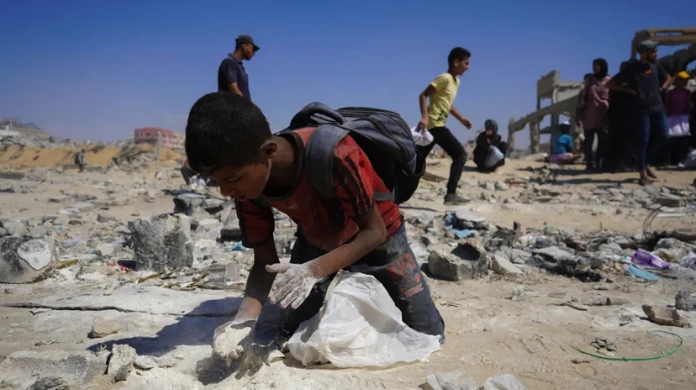Hadja Lahbib, European Union Commissioner for Equality, Preparedness, and Crisis Management, has issued a stark appeal to Israel, urging an immediate end to what she terms a “starvation policy” against the Gaza Strip. Speaking in early August 2025, Lahbib condemned the worsening humanitarian disaster in Gaza, emphasizing the “shattering” scale of civilian suffering amid the ongoing blockade and conflict.
Calling on Israeli authorities to allow the effective delivery of humanitarian aid at scale, Lahbib stressed the urgency of alleviating the dire conditions faced by over two million Palestinian residents trapped in the enclave. Her plea went beyond mere political rhetoric, expressing deep concern about malnutrition, shortages of essential supplies, and the overall deterioration of living conditions.
Human Toll and Disturbing Statistics
Since hostilities escalated in October 2023, Israeli military operations have reportedly claimed the lives of over 60,400 Palestinians in Gaza, with the majority being women and children. This staggering death toll underscores the intensifying humanitarian emergency. In contrast, approximately 1,200 people have been killed in Israel during the conflict, including about 250 taken hostage by Hamas militants.
Current estimates indicate that at least 50 hostages remain in Gaza, with around 20 confirmed alive. These hostage situations add a complex and urgent dimension to the conflict’s human cost, further complicated by the civilian suffering detailed by aid organizations.
Humanitarian reports indicate growing famine conditions, especially among children, with evidence of starvation emerging despite Israeli government denials. Severe shortages of food, medical supplies, clean water, fuel, and electricity have compounded the crisis, creating an unfolding catastrophe.
Calls for Humanitarian Access and Urgent Relief
Commissioner Lahbib’s statement was unequivocal: an end must be put to the “weaponization of hunger” in Gaza. She condemned Israel’s blockade policies that prevent the sufficient delivery of life-saving aid, calling for the reopening of secure corridors for humanitarian relief. Lahbib also highlighted the need for the release of all Israeli hostages, reiterating that “humanity must prevail” in the face of ongoing violence.
Her criticisms come as the United Nations and multiple aid groups have repeatedly warned of the rapid deterioration of conditions in Gaza, emphasizing that continued blockade and restrictions threaten to push the region toward famine.
European Union Response: Divisions and Diplomatic Efforts
The EU’s response to the Gaza crisis has been multifaceted but also marked by internal divisions. Several member states, including Sweden, the Netherlands, and Spain, have advocated for stronger punitive measures against Israel, such as freezing Israel’s access to EU trade agreements and research funds. These measures aim to leverage economic pressure to encourage compliance with humanitarian standards.
However, diplomatic efforts within the EU have faced significant obstacles. Countries like Germany and Italy have expressed reservations, favoring dialogue over sanctions due to historical and strategic ties with Israel. This lack of consensus has stalled formal punitive actions, leading to criticism that the EU is failing to adequately respond to the humanitarian emergency.
In July 2025, EU ministers opted for a cautious approach, requesting ongoing updates from Israel on aid deliveries rather than imposing immediate sanctions. Israeli officials described the EU’s proposals as unjustified and warned that sanctions would strengthen Hamas’s position.
Israel’s Position on the Blockade and Humanitarian Claims
Israel maintains that there is no intentional starvation in Gaza, attributing the humanitarian crisis largely to Hamas’s control and the complexities of distributing aid within a conflict zone. The Israeli government points to “humanitarian pauses” and the creation of “secure routes” for aid deliveries as proof of its commitment to mitigating civilian suffering.
Nevertheless, aid groups and independent observers dispute these claims, reporting insufficient and unreliable access for humanitarian operations. Multiple organizations have underscored the urgency of expanded, unhindered aid flows to avert a full-scale famine and catastrophic health outcomes.
The Wider Humanitarian and Geopolitical Context
The Gaza crisis, exacerbated by military hostilities and economic blockade, has triggered escalating international condemnation and concern. Videos revealing the deteriorating condition of hostages have intensified global calls for humanitarian corridors and ceasefires. EU diplomats and humanitarian officials have described the ongoing refusal to deliver adequate aid as an “absolutely incriminating” failure that exacerbates civilian suffering.
The EU’s position, articulated by Commissioner Lahbib and others, highlights a broader conflict between maintaining strategic diplomatic ties and upholding fundamental human rights. The humanitarian situation remains precarious, and international actors face mounting pressure to adopt stronger measures to protect civilians and ensure compliance with international humanitarian law.
Moving Forward: Challenges and Imperatives
With the situation in Gaza rapidly deteriorating, Commissioner Lahbib’s demands underscore the critical need for immediate, large-scale humanitarian intervention. The EU and global community face a pressing test in balancing geopolitical complexities with the imperative to prevent a humanitarian catastrophe.
The crisis also raises urgent questions about accountability, the protection of civilians in conflict zones, and the responsibilities of occupying powers under international law. The continued blockade, restrictions on aid, and rising civilian casualties call for an intensified and coordinated international response to halt the cycle of starvation and suffering in Gaza.









